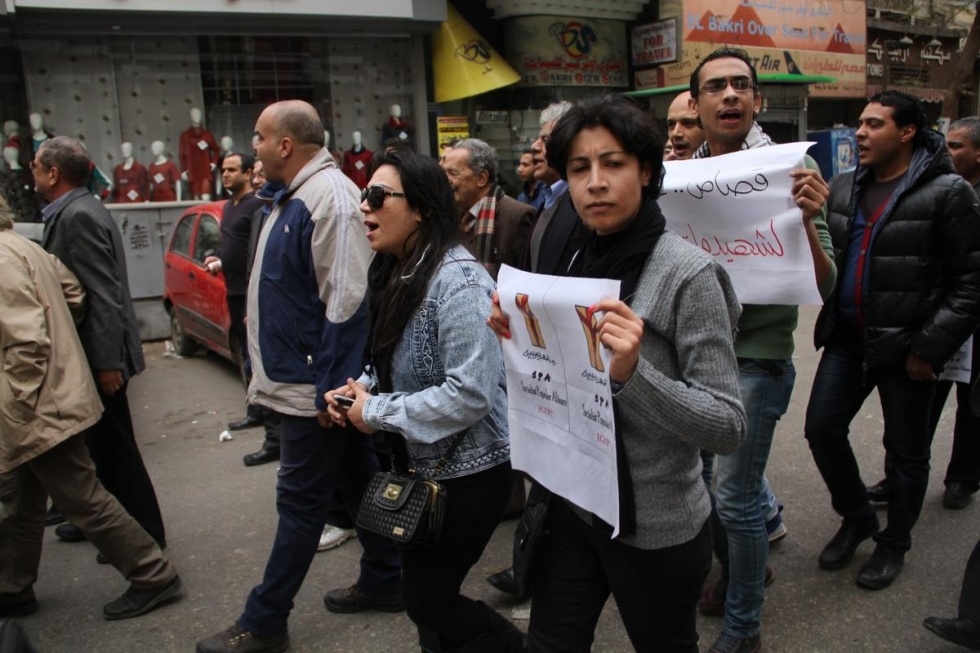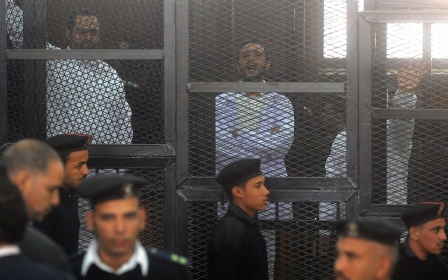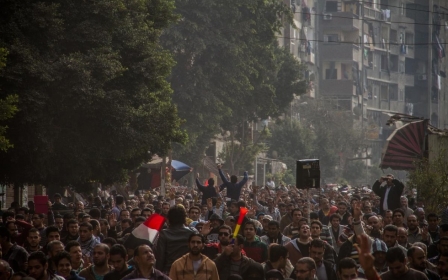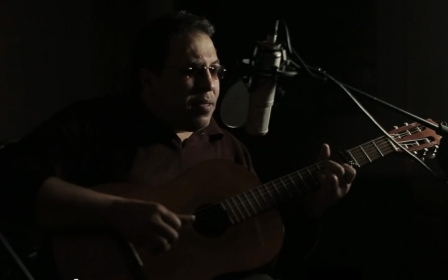Eyewitnesses to murder of Egyptian activist arrested

CAIRO: Five eyewitnesses to the murder of a prominent activist shot dead in Cairo last weekend were arrested and charged after offering to give evidence to a public prosecutor investigating the case, a number of eyewitnesses, activists and human rights organisations have said.
Shaimaa al-Sabbagh, 31, was carrying a wreath of flowers to Tahrir Square on Saturday, the eve of the 25 January revolution anniversary, when she was killed as police attacked a small group of demonstrators marching through the city with banners.
Egypt’s public prosecutor is currently formally investigating her killing. However, when witnesses to the shooting went to the public prosecutor in Abdeen police station on the evening of 24 January to provide testimony on the incident they were “shocked”, they told Middle East Eye, to find that they were charged with “participation in a demonstration that disturbed public security”.
Azza Soliman, a lawyer and the founder of the Centre for Egyptian Women's Legal Assistance, who said she did not participate in the demonstration, but only witnessed the events, waited five hours to give her testimony to the chief prosecutor.
“After I had given my testimony I was about to take my luggage and leave, but the prosecutor started to accuse me,” she said. “He said 'now it's your turn' - at first I laughed and thought he was joking, then they said I was arrested.”
“I objected and said that it’s illegal and that I'm a volunteer witness,” Soliman said, although she insists that the prosecutor refused to listen to her protests or to those of another lawyer who attended the prosecutor's office with her to give his own testimony.
Soliman said she was having lunch with her family in a well-known nearby restaurant, Cafe Riche, when marchers, including Sabbagh, reached Talaat Harb Square.
Soon after she left the cafe to greet friends whom she recognised in the demonstration crowd, shots were fired. “Tear gas and bullets were shot, everybody ran . . . the police were running everywhere chasing people,” she said.
“I saw somebody who fell down on the street. I couldn't recognise whether it was a man or a woman. Later on I knew that she was a woman,” Soliman said.
“I saw the blood and I saw a man next to her who was shouting for an ambulance, then a masked police officer approached them. From what I understand she died within minutes – it was horrible.”
Soliman said she testified that the march was peaceful, that there were no more than 30 people carrying flowers and banners, and that masked police officers attacked demonstrators with tear gas and birdshot. Crucially, she also said that she testified that she was sure that masked police had killed Sabbagh.
“The regime has decided to shut up all voices, even those who say the truth through a testimony. There is no law now it seems. They just do what they want - it's crazy,” Soliman said.
While the investigation into the death is ongoing, the government has been dismissive of reports that Sabbagh was killed by a police officer. "The police are not armed during protests except for tear gas," Interior Minister Mohamed Ibrahim said in a press conference earlier this week. "If we were firing birdshot on Talaat Harb, there would have been a lot more than just one woman shot."
But other eyewitnesses who have come forward have also pointed the finger at the authorities. Ahmed Ragheb, another lawyer and member of the National Community for Human Rights and Law, said he also witnessed what happened the day that Sabbagh was killed. He too went to the prosecutor's office in Abdeen police station to voluntarily offer his testimony as a witness.
“As soon as I gave my testimony I was myself charged for being part of the demonstration, which was not true and I had gone to them myself to testify - this is completely unacceptable,” Ragheb told MEE.
“I witnessed the events in the square that day and I can say it was completely unjustified use of force. In fact it was unlawful killing - many witnesses saw this,” he said.
Ragheb said in a statement that any use of force by the police must be in accordance with the rules of proportionality, especially where the right to peaceful assembly is concerned.
“This was a case of police using force and guns to deal with a peaceful demonstration and it has resulted in the death of Shaimaa,” Ragheb said in a statement.
According to the Cairo Institute for Human Rights Studies (CIHRS) a total of five witnesses were charged after coming forward to give their testimony on the killing of Sabbagh. The prosecution has released all the charged witnesses pending investigation, but Soliman explained that she remains unsure of her legal status in relation to the case.
“Cases like this show that even the relative independence of the judiciary under [former President Hosni] Mubarak is gone now under the very heavy hand of the security services which has caused the collapse of justice in Egypt,” said Bahey Eldin Hassan, the director of the CIHRS.
“The government is fighting every independent voice, Islamist, secularist, or whatever under the banner of fighting terrorism,” he told MEE. “They say they are stabilising the country, but in fact they are encouraging radicalisation with these violent policies.”
Security forces have also arrested a further six participants who had marched alongside Sabbagh. While they have been released pending investigation, they have been charged with participation in a demonstration that “infringed public security” and with assault against security forces personnel, the Cairo Institute said in a statement on Wednesday that was signed by eight Egyptian human rights organisations.
The Hisham Mubarak Law Centre, an NGO that works closely with detained activists, has confirmed the arrests.
The arrests have further fuelled tensions and on Wednesday, human rights lawyers and activists held a women’s protest in Cairo’s Talaat Harb square to protest against Sabbagh’s killing, as well as the killing of other demonstrators this year. The protest was also attended by a counter-demonstration in support of President Abdel Fattah al-Sisi, although security forces did not attempt to stop the protest.
Middle East Eye propose une couverture et une analyse indépendantes et incomparables du Moyen-Orient, de l’Afrique du Nord et d’autres régions du monde. Pour en savoir plus sur la reprise de ce contenu et les frais qui s’appliquent, veuillez remplir ce formulaire [en anglais]. Pour en savoir plus sur MEE, cliquez ici [en anglais].




